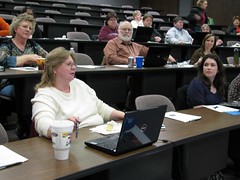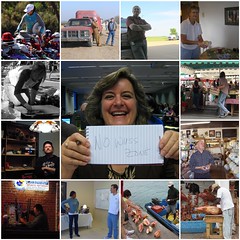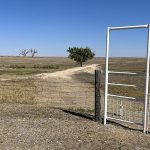Building entrepreneurial communities means doing everything you can to welcome, develop and support entrepreneurs. And it doesn’t have to be hard.
That was my take away from the webinar that Dave Shideler and Oklahoma State University presented on Building Entrepreneurial Communities. Here are some of the key points that I typed up as he went.
What does “entrepreneur” really mean?
An entrepreneur is technically anyone who undertakes, who manages. Shideler is using this term interchangeably with small business for the purpose of this webinar.
Atwoods, Wal Mart, Hastings, and Dollar General are all chains that started in local rural communities.
How valuable are local small businesses?
Locally owned businesses have a social and sustainablity impact. (They make a positive difference in the community.)
- Small business owners have a commitment to place. Let’s face it, if you grew up here, you have family here and you are part of the community, you’re less likely to pull up stakes for the first offer of a tax incentive from a competing town.
- Local businesses have decentralized procurement. That means they are more likely to buy more of their needs locally.
- They promote the development of trust and ‘bridging’ social capital. The entrepreneurs have ties in the community beyond just their customers. They are members of churches and other organizations. That helps the cross pollination of ideas and flow of information.
- Local businesses help develop social cohesion. The social cohesion we’re talking about is the common feel or experience to the community. Locally owned businesses can better fit in with that than chains. It helps create unity within the community and ability to address concerns. This is kind of like clusters in economic development.
- Locally owned businesses can insulate the community from national/regional events. Locally owned banks helped insulate Oklahoma from national housing crisis.
- Environmental benefits are less clear-cut. They may have less transportation impact, but academic literature is still uncertain. Loss of efficiency in production may offset the transportation gains.
Quantifying the value of small business

Small business workshop in Alva, Oklahoma.
Shideler asked participants how they quantified the value and significance of small businesses to their communities. The answers included:
- Count of businesses that open versus close
- Track attendance at small business workshops
- Track attendance at the local networking group
- Track sales tax and count the number of small business clients
Shideler said that county level data on small business is available on youreconomy.org. The data shows that small businesses are very important in creating employment in Oklahoma.
What makes a community entrepreneur friendly?
Shideler pointed to three factors: Climate, Infrastructure, and Support Systems.
Improving your Entrepreneurial Climate:
- Awareness – Do local leaders know about and set goals for entrepreneurial activity?
- Recognition – Do local leaders try to find out challenges local business face?
- Culture – Is innovation welcomed? Is change a bad thing? How does your community accommodate failure?
- Anonymity – Can they participate in the community, without being negatively identified as entrepreneurs or business owners?
- Quality of Life – What amenities do you offer?
Two viewers shared ideas from their own communities.
- Sandy Meier said they started making YouTube commercials for entrepreneurs. (Killer idea!)
- Jackie Jacobi said their chamber of commerce gives out Free Enterprise Awards.
Make the most of your Entrepreneurial Infrastructure:
- Real Estate – Entrepreneurs need a different kind of real estate than recruited businesses. Residential zoning flexibility matters. Commercial kitchens. Small office space. Renovate second floors downtown for office space.
- Utilities – Broadband access.
- Services – Success or failure rests in their recognition of what they do best. Most aren’t great at everything. So if you want to be entrepreneur friendly, need to make those other services (marketing, finance, bookkeeping) available.
- Taxes and regulations – Can your community make it easier to do business? Consider permits, licenses, utility sign ups. Can you offer a single sign up form?
- Networking – a huge component, because entrepreneurs just do business differently. It is a shortcut to them. If your community does not have an entrepreneurship network, that’s an easy way to begin to support the entrepreneurs in your community.
Viewers shared some local ideas on infrastructure.
- Barry Clark mentioned building wifi zones.
- Stacy Darty mentioned their monthly morning networking.
- Arun Tilak mentioned entrepreneur contests.
- Terri Boyd mentioned inexpensive trade shows.
Entrepreneurial Support Systems:
This is the group of services and programs in your community to encourage and benefit the entrepreneur. There is a progression of services: essential, more intensive, most extensive. As entrepreneurship gains traction, you can add more services.
First, create the climate and infrastructure:
- Increase awareness, recognize their contributions, facilitate networking.
- Ensure access to appropriate private business services, such as business law, bookkeeping, and marketing.
Second, get more intensive:
- Entrepreneurial training
- Access to financial capital (borrowing, not venture: Local banks are more important than venture capital to local entrepreneurial community development.)
- Access to markets
- Youth entrepreneur projects
Third, most extensive:
- Customized help with business plans, etc.
- Angel investment/venture capital sources.
- Integration of entrepreneurship into local schools. Start by interacting with existing extracurricular groups.
- Entrepreneurial support organizations.
How ready is your community to be entrepreneurial? You’ll find lots of tools from the Center for Rural Entrepreneurship to help you assess your readiness.
What are ways of becoming entrepreneur-friendly?
There is no free lunch, Shideler said. It will take work, though it may not require much budget.

1. Appreciate your entrepreneurs.
- Feature them in the local paper.
- Pass city council resolutions supporting entrepreneurs.
- Integrate entrepreneurship into local economic development plans.
- Give Chamber of Commerce awards.
2. Use partnership, collaboration and cooperation.
- Share infrastructure with neighboring communities such as sharing economic data, or extending incubators across borders.
- Utilize existing low-cost or free services including sba.gov, energizingentrepreneurs.org, extension.org/entreprenership.
- Leverage local resources, including the school system, library, county extension, career tech, and community colleges. Ponca City, Oklahoma, is doing youth entrepreneurship projects through their alternative schools. (Remember that many of the world’s most successful entrepreneurs were failures in traditional schools.) Do a special business training program with the library. Promote the data services that are available.
3. Promote socializing.
- Establish networks and organize interest groups.
- Use technology: publish blogs about your place, participate in social networking (facebook, linkedin), social bookmarking and list making.
- Listen to your entrepreneurs and small business owners.
Conclusions
- Entrepreneurs are important to our economy
- In Oklahoma, they are critical to the stability and growth of our economy.
- Local governements need to be intentional to support this segment of their economies.
Resources
Update: Recordings are available of three webinars on Building Entrepreneurial Communities by Shideler.
There are many more tools from the Center for Rural Entrepreneurship.
County level data on small business is available on youreconomy.org.
Low-cost or free services to help your entrepreneurs: sba.gov, energizingentrepreneurs.org, extension.org/entreprenership.
Update: I caught Shideler for two short videos on rural entrepreneurship.
New to SmallBizSurvival.com? Take the Guided Tour. Like what you see? Get our updates.
- About the Author
- Latest by this Author
Becky started Small Biz Survival in 2006 to share rural business and community building stories and ideas with other small town business people. She and her husband have a small cattle ranch and are lifelong entrepreneurs. Becky is an international speaker on small business and rural topics.












‘Appreciate your entrepreneurs’
Out of all the great notes here, this struck me as one place where we really need to do better. There is not only a lack of appreciation (value) of all the benefits business brings to a community, but also a lack of appreciation (understanding) of the challenges, risks and personal demands that running a business places upon an entrepreneur.
I have to agree, Derrick. Most people have never been a small business owner themselves, so they just don’t know what it’s like.
Becky,
Great Summary!. I attended the very first Energizing Entrepreneurs training back in the 2003. The Center for Rural Entrepreneurship has a great framework for helping communities support entrepreneurs. I highly recommend the training to any rural economic development professional.
Mike, thanks for sharing your personal experience with CFRE.
This is a fantastic post, Becky! I’m am fortunate enough that I built my business online while living in a big city but have just moved back “up home” and – if all goes well – plan to hang out my shingle in my small town here in Georgia. Right now I’m still researching the small business climate here, and this post gave me a lot of things to look for. I have a feeling my town has very few of these perks, but as one of the fastest growing counties in the country, wants to or is trying. I’m going to save this for my next Chamber of Commerce meeting! Thank you!
Jennifer, I applaud you for working to improve your own community. Some of these are not too hard to implement, and will benefit all your local businesses.
These are wonderful tips for how to support and expand small local businesses. I will be sharing and linking to it regularly to encourage more communities to realize the importance of supporting local businesses.
I regularly write about why local businesses are the solution to our economic challenges and share tips on priorities for Small Business Internet Marketing.
I encourage anyone involved in supporting small businesses to connect with me so that we can multiply our reach and effectiveness.
Hi Becky,
Great summary! This is the kind of thing my small town needs. I have been trying to brainstorm ways to help bring vitality back, and making the way for an entrepreneurial spirit seems like the best bet. We can’t force business into our small towns, but we sure can do more to make them welcome and help them thrive!
I plan to develop a blueprint from these notes and the resources they will inevitably lead me too!
Gail, glad you found use in this piece.
Bradford, awesome! Definitely check out the items from Center for Rural Entrepreneurship. Their Energizing Entrepreneurs materials are outstanding for working with your community.